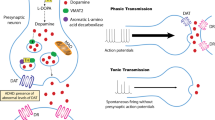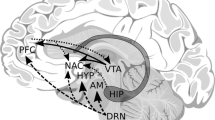Abstract
The 5-HT3 receptor is thought to play a role in the reward pathway and the phenomena of drug abuse by modulating dopamine release in the mesolimbic pathway. Studies involving this receptor have been hampered due to the low level of 5-HT3 receptors in the CNS. A 5-HT3 receptor over-expressing mouse was produced to study the role of this receptor in the rewarding properties of drugs of abuse. Over-expression was restricted to the forebrain by controlling gene expression with the Ca2+ calmodulin (CAM) kinase IIα promoter. No over-expression was detected in other body organs nor the cerebellum, as measured by ligand binding and Northern analysis. 5-HT3 receptor over-expressing mice drank less alcohol than non-transgenic mice in a two-bottle free choice test. Over-expression of the 5-HT3 receptor in these mice resulted in a decrease in ethanol consumption. These mice should prove useful in testing hypothesis regarding a common reward pathway for drugs of abuse and the role 5-HT3 receptors play in this pathway.
Similar content being viewed by others
Author information
Authors and Affiliations
Additional information
Received: 17 June 1998 / Final version: 14 August 1998
Rights and permissions
About this article
Cite this article
Engel, S., Lyons, C. & Allan, A. 5-HT3 receptor over-expression decreases ethanol self administration in transgenic mice. Psychopharmacology 140, 243–248 (1998). https://doi.org/10.1007/s002130050763
Issue Date:
DOI: https://doi.org/10.1007/s002130050763




